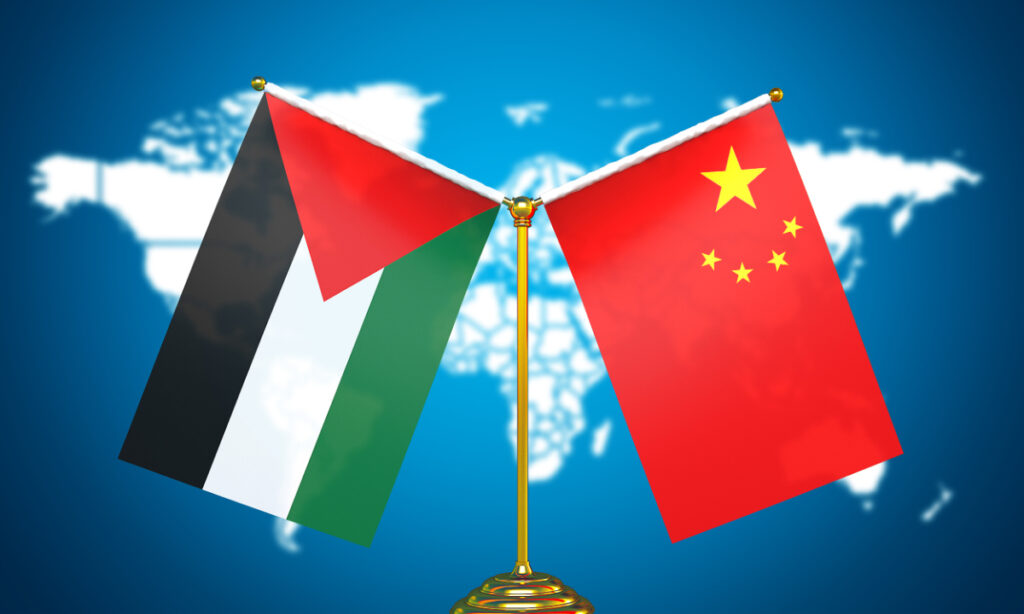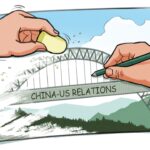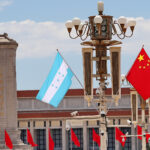President of the State of Palestine Mahmoud Abbas arrived in Beijing on Tuesday, starting a four-day state visit to China.
Experts said it will be a great chance for China and Palestine to promote their traditional friendship to new heights and for China to put more efforts into promoting peace and stability in the region under the guidance of the Global Security Initiative (GSI) proposed by President Xi Jinping and by improving regional development.
In past decades, more and more regional countries find that US policy on Middle East issues, including the Palestine-Israel conflict, the Iranian nuclear deal and the Syria crisis, is unreliable and unsustainable. Not only has the US failed to solve regional problems to bring peace and development to the region, but it has added more tensions and chaos, which is causing regional countries to lose faith in the US and expect China to play a greater role in promoting peace, stability and development in the region, analysts said.
Good old friend
Calling Abbas an “old and good friend” of the Chinese people, Chinese Foreign Ministry spokesperson Wang Wenbin noted that the Palestinian president would be the first Arab head of state to be hosted by China this year.
China-Palestine relations have maintained a good momentum of growth with stronger political mutual trust and deeper friendship between the two peoples, Wang said at the regular press briefing on Friday.
China is one of the first countries to recognize the Palestine Liberation Organization (PLO) and the State of Palestine. In May 1965, the PLO set up an office that was treated as a diplomatic mission in Beijing, and in November 1988, China formally established diplomatic ties with Palestine, according to the website of the Chinese Foreign Ministry.
Wu Sike, former special envoy of the Chinese Government on Middle East issues, told the Global Times on Tuesday that “This year marks the 35th anniversary of the establishment of diplomatic relations between China and Palestine. Abbas’ visit is of special significance to bilateral relations.”
The Middle East is undergoing significant changes, and this is a special period. Now Saudi Arabia and Iran have entered a process of reconciliation with help from China. This has led to a wave of reconciliation in this region among different countries, Wu said.
With this important background, the world, especially Middle East countries, is paying attention to whether such reconciliation will promote the settlement of the long-standing and complicated Palestinian question, Wu noted.
Tunc Akkoc, editor in chief of Harici Media in Turkey, echoed the view of Chinese analysts as he told the Global Times on Tuesday that “As a matter of fact, China’s mediation efforts in the Middle East have begun to pay off.”
Li Haidong, a professor at the Institute of International Relations at the China Foreign Affairs University, told the Global Times on Tuesday that in the past, when Saudi Arabia and Iran were confronting each other, they backed different forces within Palestine, so that the disunity within Palestine was a serious problem that impacted the solution of Palestine-Israel conflict, but now, with the Saudi-Iran reconciliation, this problem will be gone.
Palestine-Israel issue
While China makes efforts to promote peace in the region, the US seems jealous and worried, as Washington is concerned that “Beijing is expanding its influence” in the region where the US has been the main power broker for decades, said some media in the Middle East.
The Times of Israel said in a report on Tuesday that “Beijing has sought to boost its ties to the Middle East, challenging long-standing US influence there – efforts that have sparked unease in Washington.”
“In fact, it is the US that cares most about its own influence and hegemony when intervening in Middle East affairs. The US might not want to see regional conflicts totally losing control, but it also tries to keep those conflicts from a peaceful solution, so it always plays the game of ‘divide and rule’ to push confrontations between blocs, and to force regional countries to fight against each other,” Li said.
China’s efforts will provide hope for regional countries to change this situation and also the hope of realizing sustainable peace and security, Li said.
Qiu Wenping, an expert on Middle East studies and a professor at Fudan University, said “the foundation of US strategy on Middle East is to use the US-Israel-Saudi alliance to confront Iran, and China’s mediation on Saudi-Iran ties breaks the foundation of US strategy.”
Wu said that by communicating with Israeli think tanks and some other groups in the past, we found that there are rational people and thinkers within Israel who believe that Israel cannot realize sustainable peace by only solving the problems with the use of force. A long-term and sustainable peace that serves the fundamental interests of Israel needs to be realized via a political solution with Palestinians.
China’s constructive role
In April, Chinese State Councilor and Foreign Minister Qin Gang told his Palestinian counterpart that China is willing to aid peace negotiations. Qin said China supports the resumption of peace talks between Palestine and Israel as soon as possible on the basis of the “two-state solution,” and is willing to play an active role in this regard.
Chinese Foreign Spokesperson Wang Wenbin said at a press conference on Friday that the Palestinian question is at the heart of the Middle East issue and matters to the region’s peace and stability and global equity and justice. China has all along firmly supported the Palestinian people’s just cause of restoring their legitimate national rights.
As a permanent member of the UN Security Council, China will continue to work with the international community for a comprehensive, just and enduring solution to the Palestinian question at an early date, said Wang.
Akkoc from Turkey, who is also an observer on the Middle East issues, said “China’s peace plans that offer non-imposing and fair options are very meaningful,” and “the so-called ‘Deal of the Century’ plan by the US under the Trump administration is a text agreed between the US and Israel and based on the unconditional surrender of the Palestinians.
It is clear that these impositions were not effective nor were accepted by the Palestinians, and further fueled the conflict, Akkoc said. “Therefore, it is very important that China presents solutions and plans that take into account the interests of the relevant parties fairly, listens to the parties and feeds on their demands rather than imposing on them,” he told the Global Times.
In addition, internal US politics will bring high uncertainty if Middle East countries rely too much on Washington to find solutions to regional problems, because if conservative US political forces led by Donald Trump return to power after the presidential election next year, Washington’s policy will show a U-turn compared to the Biden administration and this will certainly affect everyone, analysts said.
(Global Times)




